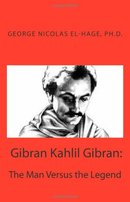Gibran Kahlil Gibran: The Man Versus the Legend
This concise book on Gibran is meant to be a quick but informative read that affords the Gibran scholar and student alike some useful information that may not be easily available, and if so, is buried in the midst of the massive volumes of biographies and criticism on Gibran. The title is intended to raise questions about scholarship pertaining to Gibran’s life and to query certain critics about the authenticity of their information and sources.The book is divided into six chapters: three are in English and three are in Arabic. I have also included my translation into English of the original Arabic text of Gibran’s Unpublished Letters to Archbishop Antonious Bashir. These letters shed light on an otherwise obscure corner of Gibran’s personality and scholarship. Although Gibran belongs to two distinct worlds and two different alphabets, he succeeded through his global message of love and peace to create harmony between civilizations and unity between languages. He combined the best of the East and of the West and lived a life of simplicity and dignity. Gibran is considered to be the poet who truly modernized Arabic poetry and infused it with a new breed of ideas and words. He created a stylistic revolution that revitalized the Arabic language and set it on a new course worthy of its magnificent heritage. As for his adopted language, he certainly enriched the English language with a stream of thought and style that is only reminiscent of certain books of the Bible. Next to his mentor, William Blake, Gibran stands out as the poet of the Bible par excellance.
This concise book on Gibran is meant to be a quick but informative read that affords the Gibran scholar and student alike some useful information that may not be easily available, and if so, is buried in the midst of the massive volumes of biographies and criticism on Gibran. The title is intended to raise questions about scholarship pertaining to Gibran’s life and to query certain critics about the authenticity of their information and sources.The book is divided into six chapters: three are in English and three are in Arabic. I have also included my translation into English of the original Arabic text of Gibran’s Unpublished Letters to Archbishop Antonious Bashir. These letters shed light on an otherwise obscure corner of Gibran’s personality and scholarship. Although Gibran belongs to two distinct worlds and two different alphabets, he succeeded through his global message of love and peace to create harmony between civilizations and unity between languages. He combined the best of the East and of the West and lived a life of simplicity and dignity. Gibran is considered to be the poet who truly modernized Arabic poetry and infused it with a new breed of ideas and words. He created a stylistic revolution that revitalized the Arabic language and set it on a new course worthy of its magnificent heritage. As for his adopted language, he certainly enriched the English language with a stream of thought and style that is only reminiscent of certain books of the Bible. Next to his mentor, William Blake, Gibran stands out as the poet of the Bible par excellance.

